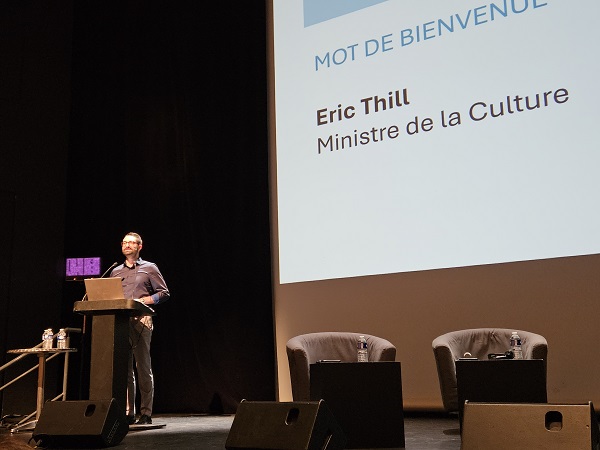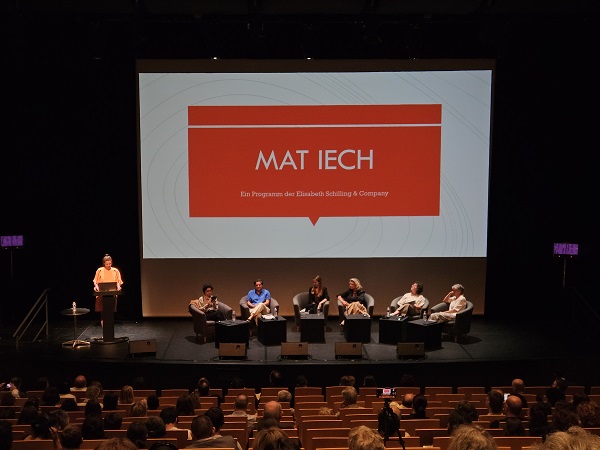 Eric Thill, Luxembourg's Minister for Culture;
Credit: Jazmin Campbell, Chronicle.lu
Eric Thill, Luxembourg's Minister for Culture;
Credit: Jazmin Campbell, Chronicle.lu
On Wednesday 25 June 2025, the "Assises Culturelles" (Cultural Conference) took place at the Centre des Arts Pluriels Ettelbruck (CAPE) and Hariko in Ettelbruck, bringing together more than 300 cultural, social and institutional stakeholders around the central theme of access to culture.
The event was split into two parts, starting with a plenary session at CAPE in the morning and continuing with workshops at Hariko in the afternoon.
Luxembourg's Minister for Culture, Eric Thill, opened the conference by highlighting the country's dynamic cultural sector, as well as its creativity and diversity. He emphasised that culture is not only a mirror of Luxembourg society but also a means of active participation. However, he acknowledged the ongoing challenge of unequal access to culture.
"Strengthening access to culture is enshrined in the coalition agreement and is a major political priority for me," Minister Thill stated. "That is why we have begun developing a national action plan on access to culture, which aims to break down barriers, whether social, geographical, physical or symbolic. The objective is clear: to enable everyone - regardless of their age, origin, situation or background - to participate fully in the cultural life of the country".
A newly created unit within Luxembourg's Ministry of Culture will coordinate this national action plan, which is set to be implemented in 2026 and 2027 and will involve regular consultations with cultural and social stakeholders, as well as ongoing monitoring.
The plan is based on eight key priorities: accessibility and removal of barriers; social cohesion through inclusion and diversity (including support for volunteering); cultural education for all ages; territorial equity in cultural access; improved visibility and strengthened cultural mediation; digital innovation to support visibility and access; protection and promotion of cultural heritage; cultural tourism.
The conference also included a presentation of the results of a national survey on cultural life in Luxembourg, commissioned by the Ministry of Culture and conducted by ILRES in 2024. As reported by Laurence Brasseur, Coordinator of the ministry's Culture Observatory, 82% of residents consider culture important, but participation is still influenced by regional, educational and socioeconomic factors. Key barriers to cultural access included lack of information (33%), disinterest (26%) and cost (23%). Read more on the survey at https://chronicle.lu/category/culture/54920-culture-plays-important-role-in-lives-of-82-of-luxembourg-residents
World Health Organization (WHO) consultant Ameer Shaheed subsequently spoke about the connection between culture and health. Drawing on scientific data, he demonstrated how the arts can contribute to the prevention, treatment and management of various health issues. He called for integrated policy frameworks which promote intersectoral collaboration between culture and health, as well as the development of coherent public policies.
The morning also featured presentations of innovative cultural initiatives: Elisabeth Schilling presented her dance outreach project Mat Iech; Sandy Artuso and Enrica Pianaro of the Laboratoire d'Études Queer, sur le Genre et les Féminismes - LEQGF Asbl addressed gender, sexuality and intersectional equality in the cultural sector ("Queerising Cultural Transmission"); architect Tatiana Fabeck illustrated how the Château de Koerich has been made more accessible to the public (how to promote heritage in an inclusive and contemporary way); Réjane Nennig from the municipality of Differdange shared the evolution of participatory cultural development at the local level; Marie-Paule Jungblut from the University of Luxembourg detailed a participatory heritage project focused on urban neighbourhoods (inventory of popular heritage).
The session closed with a Q&A and a walking lunch, before participants regrouped at Hariko in the afternoon for five thematic workshops, focused on: visibility and communication; volunteering; education; digital access; partners and collaboration.
The Ministry of Culture confirmed that the conclusions of these workshops will help shape Luxembourg's future cultural policy, including the ongoing implementation of the Kulturentwécklungsplang (cultural development plan) 2018-2028 and the development of the national action plan on access to culture.









